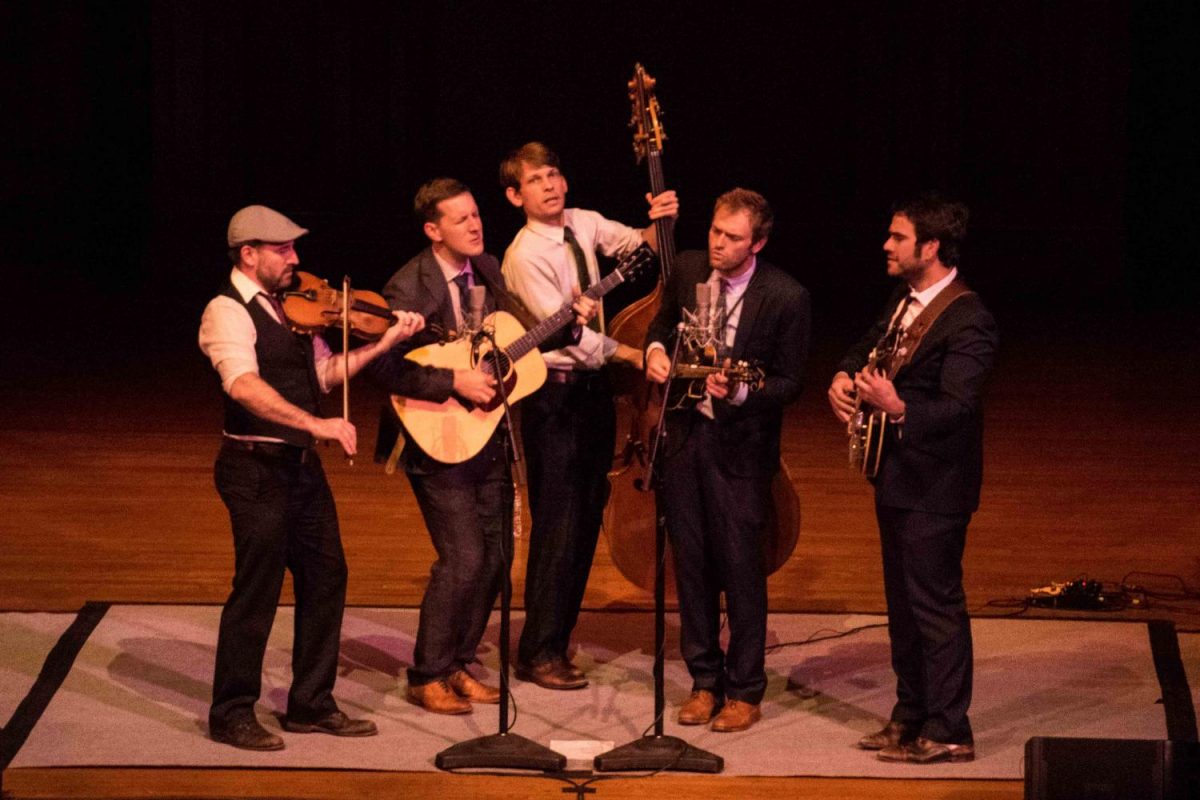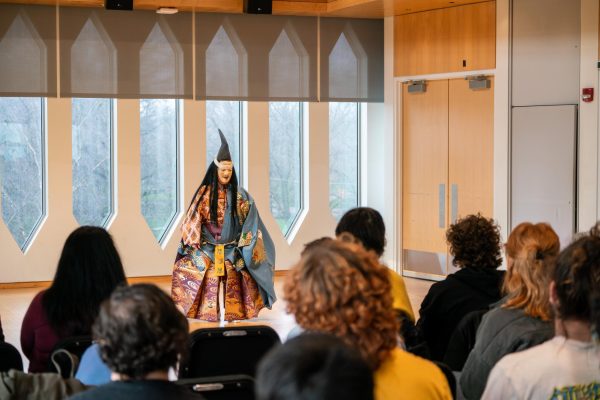Punch Brothers Infuse Bluegrass with Classical, Jazz Influences
The Punch Brothers perform in Finney Chapel last night. The sold-out concert was the culmination of their fall residency.
The Punch Brothers — a bluegrass band consisting of mandolinist Chris Thile; fiddler and violinist Gabe Witcher; banjo player Noam Pikelny; guitarist Chris Eldridge, OC ’04; and bassist Paul Kowert — returned to Oberlin this week for their fall residency, which culminated with a sold-out concert in Finney Chapel last night.
Known for their genre-bending music that incorporates elements of classical and jazz in a bluegrass aesthetic, the Punch Brothers gave a variety of talks and performances throughout the week. These included a panel on “Storytelling through Song,” a combined talk and performance on Bach and bluegrass, a talk on the history of bluegrass, a jam session with Conservatory student musicians, and a talk on the business aspects of the music world, to name a few. They also provided individual coaching sessions for many music students. The events had a wide appeal — people came from the Conservatory, College, town, and as far away as Cleveland to attend.
According to Professor of Ethnomusicology Kathryn Metz, who moderated Monday’s talk on “Storytelling through Song,” there are many reasons why such a wide variety of people would be drawn to these events.
“[The Punch Brothers] have been here before — they’re a known entity,” Metz said. “I think they’re also … very accessible musicians and humans, and that’s … exciting. They will talk to anybody about all different kinds of things, and their music — while they will certainly challenge a listener with different kinds of melodic or harmonic structures that are a bit unpredictable, or some lyrics that might be more opaque than we might be accustomed to — still often resolve in a way that is accessible.”
Andrea Kalyn, dean of the Conservatory, agreed that this wide appeal was a natural product of the Punch Brothers’ extraordinary musicianship, which has earned them extensive nationwide tours and glowing profiles in many publications, including The New York Times. She added that another dimension to their appeal was how the group plays with genre.
“They’re great artists, first and foremost, and people are compelled by great artistry,” Kalyn said. “[And] they work outside of genre. They play bluegrass music and they play new music with bluegrass instrumentation, but they approach their music as musicians first and genre second, at a very high level. I think that has a tremendous appeal across a wide range of audiences.”
The Punch Brothers’ musical styles and academic interests have certainly appealed to Oberlin, as recognized when they were made affiliate scholars in 2014, after they had already been returning to Oberlin for regular artist residencies for a number of years. Their visits to Oberlin are sponsored by the Oberlin American Roots residency program, which was established in 2013 by actor and College trustee Ed Helms, OC ’96.
One aspect of the Punch Brothers’ style that sets them apart from other groups is that they blend influences and instrumentation with both slight irreverence for and a deep knowledge of the traditions that they are working within and beyond. One prime example of this balance came during Thile’s talk and performance Tuesday, “Thile and Bach.” Though Thile played multiple highly technical Bach and Bach-influenced pieces, he also created moments of comedy with the lyrics and his performance, and emphasized that taking canonical elements of the musical tradition too seriously can be detrimental to both audiences and musicians.
“What I wanted to do today … is show you guys the way that my relationship with Bach works, and to encourage you all to have an individual relationship with Bach,” Thile said to the audience. “One of my [goals] is getting people to listen to Bach with their normal ears, not their ‘Bach ears’ — to just listen to it [without] sitting up straighter in your chair because you know it’s Bach.”
According to Metz, a great deal of the group’s success comes from their ability to share and build upon their own musical backgrounds, as well as the history of all the various musical traditions that they work in.
“Some [of the Punch Brothers] come from bluegrass, some from jazz, some from classical,” she said. “I think it’s neat to see who influences who, and to also see that music can cross a lot of different boundaries; [that] it’s not counter-intuitive to have classical music in bluegrass, or bluegrass in jazz, or jazz, bluegrass, and classical together, interwoven.”
Double-degree senior Linnea Scott, who attended many of the events this week, spoke about how learning from the Punch Brothers over her years at Oberlin has influenced her as a musician.
“They came [to Oberlin] my freshman year, and it was one of those musical life-changing experiences for me,” Scott said. “The way that they make music, the intention behind their music, and the quality of their music — they checked every box for me. … Their music was so good. It hit all the right places. And I thought, ‘This is the kind of music that I want to make.’ Not necessarily in that style, but I want to make music that makes me feel this way about music.”
One advantage of having a group of artists like the Punch Brothers return to Oberlin year after year is that their relationship with the institution will continue to evolve in ways that are beneficial for all. Kalyn, in particular, noticed how the jam sessions have changed over the years.
“When we first did the jam sessions, it was kind of a free-for-all in the [Conservatory] lounge,” she said. “It was much more about the sheer joy of music. As [the Punch Brothers] have come back more frequently, that’s one of the areas where we’ve really been able to build increased rigor. Over the last couple visits, they’ve started teaching the etiquette of jam, and really teaching people how to jam — people learn the tunes ahead of time, they’re given a playlist and they come to a pre-session … and then they come together and perform.”
Scott, who played cello during Tuesday night’s jam session at the Birenbaum Innovation and Performance space, has noticed this evolution over the time that she has been engaging with the Punch Brothers’ residencies.
“I enjoyed this year’s [jam session] better than previous years … because I really liked that there was a prep session,” she said. “People had time to get the tunes under their hands. … I think it’s good for us who don’t get to do that very often … to get out of our comfort zones.”
For Kalyn, one of the most important aspects of the Punch Brothers’ residency is how their music fosters community among musicians on multiple levels, especially because their music is so different from what the Conservatory usually offers.
“Seeing a group [of musicians] working together when it’s not your genre enables you to look at the communication, and the way the group works together, without getting caught up on the technique of the individual instrument in a way that you otherwise might,” she said. “You [can] see past the technique into the artistry in a different way. I think the notion of community … is a tremendous impact as well, and it’s something we don’t want our students to forget. [This residency] provides musical opportunities for students across the Conservatory and the College, provides a model of great artistry, and creates moments of community.”










